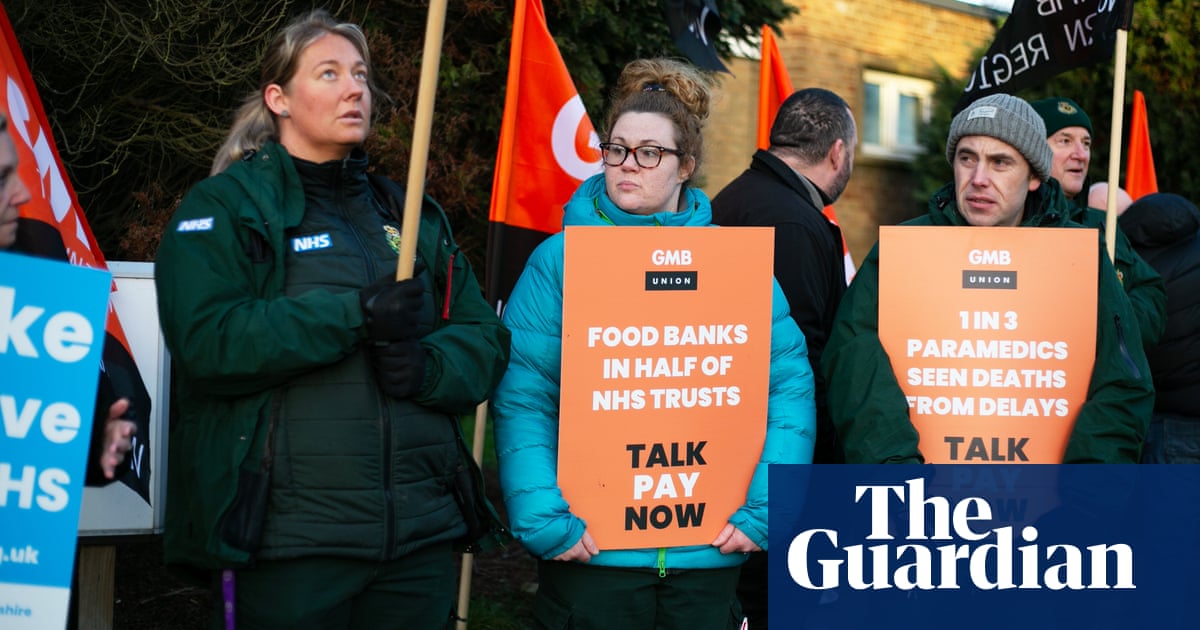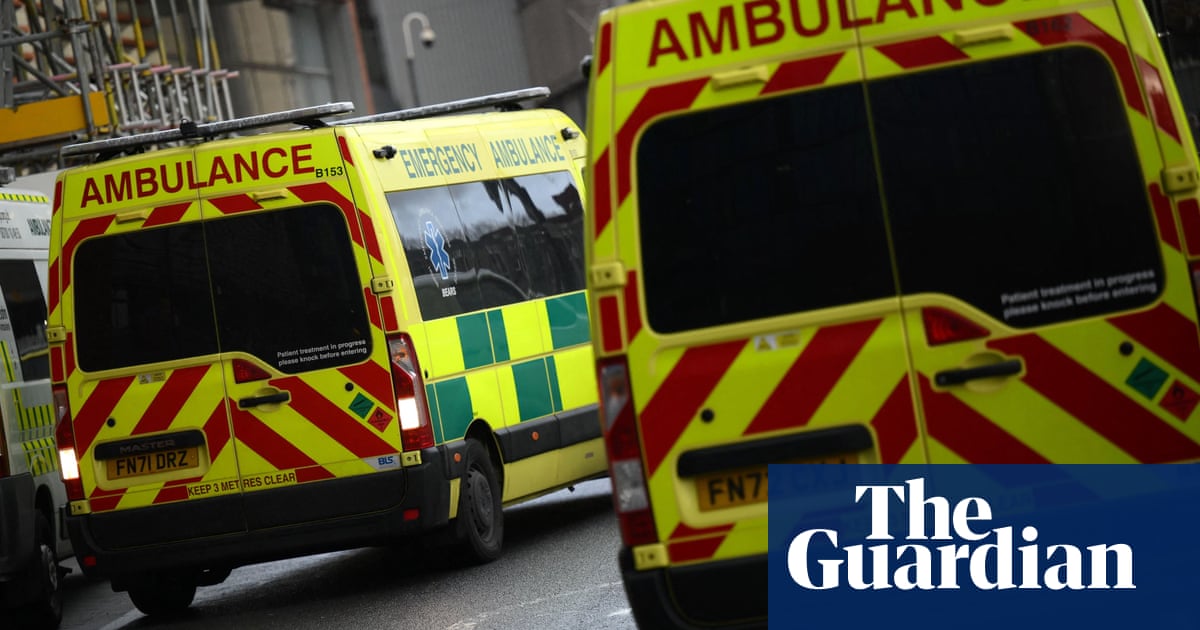
The NHS is bracing itself for an influx of patients between now and Christmas after thousands of people deferred seeking treatment during the ambulance workers’ strike on Wednesday.
Senior doctors are warning that the decision by many people in England and Wales not to request help while paramedics were staging a 24-hour stoppage will leave the NHS struggling to cope at a time when hospitals would traditionally be scaling back their services for the festive break.
The warning came amid signs that ministers, dismayed that nurses and midwives in Scotland have rejected a 7.5% pay rise, now believe that there is no deal to be done with health unions and so are now preparing for a winter-long battle of wills punctuated by strikes.
Thousands of ambulance workers, paramedics and others in England and Wales went on strike on Wednesday, leaving the NHS unable to respond to many 999 calls. Eight of 10 ambulance trusts in England declared “critical incidents” due to the pressure on resources.
Hospital chiefs praised the public for heeding NHS advice to avoid risky activity in case of being left helpless and unable to reach A&E, and to call 999 only in the event of life-threatening emergencies.
However, the leader of Britain’s A&E doctors voiced concern that the widespread stayaway on Wednesday could lead to patients’ health worsening, in the same way that people not contacting the health service when Covid-19 hit led to patients being harmed and even dying.
Calls to 999 seeking an ambulance fell by as much as 25%, while attendances at A&E were also much lower than usual, in a dramatic – but temporary – reduction in the usually intense strain on ambulance services and hospitals.
“We have anxieties about people not seeking help when they should. We saw this in lockdown,” said Dr Adrian Boyle, president of the Royal College of Emergency Medicine. “We are particularly concerned about a rebound effect, which means things could be much worse in the days to come.”
Dr Tim Cooksley, president of the Society for Acute Medicine, echoed that unease. “The festive period will be extremely tough,” he said, referring in particular to hospitals, which usually try to send as many patients home for Christmas as possible.
NHS chiefs told the Guardian that hospitals could end up being much busier and fuller than usual over Christmas, when there are usually only a limited number of staff on duty, with patients being stuck in hospital for much of the festive period.
“After the strike ends, we’ll have [ambulance] crews picking up the people who’ve been at home on the floor for a long time, plus the people who didn’t try to come in on Wednesday because they knew about the strike,” said the chief executive of one acute hospital. “We think we’ll see more people coming in on Thursday and Friday, ahead of the Christmas weekend, and with little hope of getting people home if they need support from social or community care. And then we’re into Christmas and New Year, when nothing much moves.”
Saffron Cordery, acting chief executive of NHS Providers, said hospitals were facing a backlog of operations and postponed clinic appointments because of the ambulance walkout.
She said: “Leaders across the NHS also know that as this week’s strike action draws to a close, the disruption is far from over. The fallout from strike action is likely to spill over into the coming days due to the knock-on impact across different parts of the health and care system, the need to reschedule elective and outpatient appointments, and the anticipation of a return to very high numbers of emergency calls. There is particular concern about patients who may have delayed seeking care, and whose conditions have deteriorated, now coming forward for treatment.”
The NHS Confederation said senior executives were worried that patients will face a growing risk to their health and rapid access to treatment because of what looks likely to become a long-drawn-out struggle between unions and the government in the coming months.
Matthew Taylor, the organisation’s chief executive, said: The worry is that this is just the start, and that the full impact of today’s [ambulance] strike, along with the first two nursing strikes, will not just be felt today, but also in the days and weeks to come. Their fear is that the risk to patients will intensify, with future strikes planned and no sign of resolution to the disputes.”
He pinned the blame for the growing campaign of industrial action across the NHS, and the ensuing disruption to services, on the government’s £1,400 pay offer to staff and ministers’ refusal to engage in any negotiations that might increase that sum.
“In arguably the most tumultuous winter for health this country has faced, the government must reach an agreement with trade unions. We cannot afford to let this drift into a prolonged winter of industrial action and a disruptive war of attrition.”
That prospect appears to have drawn closer, with ministers hardening their stance towards the health unions after members of the Royal College of Nursing, and Royal College of Midwives, in Scotland, rejected what the Scottish government had said was its “best and final” 7.5% pay offer.
“After that, the government aren’t going to blink. They think, ‘Well, if they’re rejecting 7.5% in Scotland then they’re going to reject anything we’re going to offer them [above the existing £1,400 offer]",’ so there’s no point in raising the offer – there’s not a deal to be done,” said a source familiar with ministerial thinking.
However, Stephen Dorrell, who was health secretary under John Major, criticised the government’s refusal to raise its offer – which equates to about a 4% rise for most staff – or to open talks over a potential increase.
Dorrell, who has since joined the Liberal Democrats, told the Guardian: “The government has played its cards really very badly. The one thing they should have been trying to do is avoid taking on the whole public sector all at once.
“There is a review body process for the health service. It would not have undermined it if ministers had simply asked the review body to look again at the NHS annual settlement, given the exceptional circumstances of having 11% inflation.”
But Steve Brine, the Tory MP and former health minister, who now chairs the Commons health select committee, backed Rishi Sunak’s refusal to revisit this year’s pay settlement – the £1,400 figure that triggered the strikes.
Brine urged ministers to stand firm in not offering more money than had been recommended by the pay review body. But he suggested next year’s pay review process could be accelerated to give ambulance workers the promise of another pay rise to come.
“There is no way ministers should trample over this process and there is no way they will,” he said. “But they can tell the pay review body that they want a shorter piece of work building on the big report they did last year. That could report back before next summer, and by then we will be in a better place. But in the meantime, the unions should halt the strikes.”












